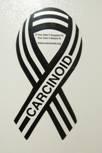To help fight carcinoid cancer
To help aid in the process of informing carcinoid patients and their families.
To help patients find the best care.
To support patients, survivors and their families dealing with carcinoid.
To share our story with others.
Our Story:
My name is Jessica and in the fall of 2005, my mother Phyllis was diagnosed with Carcinoid Cancer. (Carcinoid Cancer is a rare, deadly neuroendocrine cancer.)Little is known about this cancer, and most patients who are diagnosed with cancer are at a loss as where to begin. Well, lucky enough through the help of the Caring for Carcinoid Foundation and Carciniod Cancer Foundation,Inc., various organizations, and my mother's own determination to find the best care she could for her herself, she was able to receive the care she needed. After seeking treatment at several medical facilities, my mom turned to Dr. Woltering and Dr. Boudreaux at the Ochsner Medical Center in New Orleans, LA. Dr. Boudreaux is one of the best carcinoid surgeons in the country. In April of 2007, she underwent a very high risk surgery (almost 9hrs) that literally saved her life. Her prognosis went from 2 months to hopefully 4 years or more! I am happy to report is she is healing wonderfully, and has become an active member in the carcinoid community.
I hope this page will help inform other carcinoid patients and their families about different carcinoid organizations, and treatments and the importance of self advocacy.
FACTS:
The American Cancer Society defines carcinoid as the following:
Like most cells of the body, gastrointestinal system neuroendocrine cells sometimes undergo certain changes that cause them to grow too much and form tumors. The tumors that develop from neuroendocrine cells are known as neuroendocrine tumors (or neuroendocrine cancers). There are many varieties of neuroendocrine tumors, but the most common are the carcinoid tumors or carcinoids.
Carcinoid tumors act like the cells they come from. They often release certain hormone-like substances into the bloodstream. In about 10% of people, the carcinoid tumors spread and grow very large and release high amounts of those hormones. These cause symptoms such as facial flushing (redness and warm feeling), wheezing, diarrhea, and a fast heartbeat. These symptoms are grouped together and called the "carcinoid syndrome." Most cancers cause symptoms only in the organs they start in or spread to. But carcinoid tumors can release substances into the blood that cause symptoms throughout the body.
Carcinoid statistics, according to the American Cancer Society, are the following:* 11,000 to 12,000 carcinoid tumors are diagnosed each year in the United States
* The number of carcinoid tumors diagnosed each year has been increasing around 6% per year
* Carcinoid tumors are slightly more common in females than males
* Approximately 50% of carcinoid tumors occur in the digestive system, 30% in the lungs, and 20% in other organs
Important Links:
Sunny Susan Anderson's Carcinoid Info. Site.
